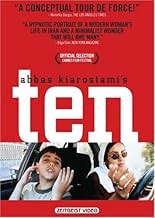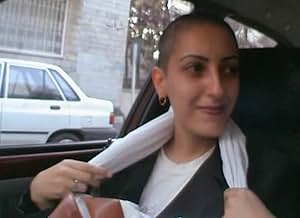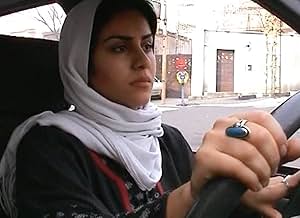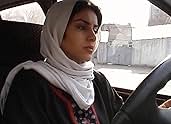A visual social examination in the form of ten conversations between a driving woman and her various pick-ups and hitchhikers.A visual social examination in the form of ten conversations between a driving woman and her various pick-ups and hitchhikers.A visual social examination in the form of ten conversations between a driving woman and her various pick-ups and hitchhikers.
- Awards
- 1 win & 4 nominations total
Amina Maher
- Amin
- (as Amin Maher)
Roya Akbari
- Prostitute + Lover
- (as Roya Arabshahi)
- Director
- Writer
- All cast & crew
- Production, box office & more at IMDbPro
Featured reviews
"Ten" really impressed me for many reasons. The first one is the interpretation of the non-professional actresses and the boy Amin Maher. It is simply amazing the first sequence (number 10) with fifteen minutes of dialogs between the lead character and her son without any cut. The second reason is the intense and impressive insight in the repressed women's world in Iran. I believe that most of the Westerns have no idea about the feelings and the culture of Iranian women, and Abbas Kiarostami shows very real dialogs picturing the lifestyle of a middle class woman and some samples in other women of different classes (the prostitute, the religious woman etc.). The third reason was the simplicity and the originality of the location: inside a car, with a divorced woman transporting her resented son; her sister; a prostitute; an old lady; and a romantic young woman, along different days. I would never imagine such a splendid scenario for a movie with such a theme. Last but not the least, the remarkable beauty of the face of the driver (Mania Akbari) is awesome: she is exotic for Brazilian standards, but really a very beautiful woman. My vote is eight.
Title (Brazil): "10 Dez" ("10 Ten")
Title (Brazil): "10 Dez" ("10 Ten")
"Ten" makes the third Iranian film I have seen. I was very impressed with the last two I saw and so I decided to see this one and I was not disappointed.
Abbas Kiarostami gives "reality tv" (movie ?) a whole new meaning by having a mini camera installed on the dashboard of a car to video tape what appears to be a woman's daily driving routine.
There are ten segments that are video taped (hence the title of the movie) as she drives to and from her daily activities.
First off, we get to see her and her son, Amin, discussing her divorce from Amin's father and how displeased Amin is with the fact that they divorced. Amin, of course, is bitter, as most children are who have had to live thru a divorce. He desperately wants to go live with his father.
Two more times throughout the movie we see Amin and his mother furthering their discussion and we get to see how their relationship continues to deteriorate.
Amin's mother and her sister are seen in one segment discussing Amin and his behavior and the aunt even gives her opinion that it might be better for the boy to go live with the father on a full time basis for a while.
We also see Amin's mother give an old lady a lift to a mauseliam so the old lady can go do her religious rituals.
Amin's mother also gives a lift to a hooker and talks with her for a while in hopes to get her to chose a different life.
All in all, the movie shows a deeply sensitive woman who wants to help others and be there for her son while being her own person.
It's truly a heart felt movie to see how caring she is even though her relationship with her son appears doomed.
Abbas Kiarostami gives "reality tv" (movie ?) a whole new meaning by having a mini camera installed on the dashboard of a car to video tape what appears to be a woman's daily driving routine.
There are ten segments that are video taped (hence the title of the movie) as she drives to and from her daily activities.
First off, we get to see her and her son, Amin, discussing her divorce from Amin's father and how displeased Amin is with the fact that they divorced. Amin, of course, is bitter, as most children are who have had to live thru a divorce. He desperately wants to go live with his father.
Two more times throughout the movie we see Amin and his mother furthering their discussion and we get to see how their relationship continues to deteriorate.
Amin's mother and her sister are seen in one segment discussing Amin and his behavior and the aunt even gives her opinion that it might be better for the boy to go live with the father on a full time basis for a while.
We also see Amin's mother give an old lady a lift to a mauseliam so the old lady can go do her religious rituals.
Amin's mother also gives a lift to a hooker and talks with her for a while in hopes to get her to chose a different life.
All in all, the movie shows a deeply sensitive woman who wants to help others and be there for her son while being her own person.
It's truly a heart felt movie to see how caring she is even though her relationship with her son appears doomed.
I have seen many impressive Iranian films over the years. "Ten" may be the very best of them for a variety of reasons. I think the film is remarkable because it looks so simple, but I imagine setting up the camera and capturing the realistic dialogue and plot-line we see in the film had to have taken a lot of preparation. I also think the director deliberately chose scenery to accommodate the backdrop of the film, and he must have driven around Teheran constantly to figure out which images to put in the background. I think the scenes with the murals of new arch-conservative president are very telling. "Ten" seems to have a lot of messages under the radar, including the subversive powers of all governments (certainly including our own in America) to censor art. I think the relationship between the mother and her son is a very poignant one, and it shows how children and adults simply live in different spheres of the universe. Film is strikingly similar in some aspects to American independent filmmaker Rob Nilsson's film "Signal 7" which came out over 20 years ago.
Ten is an intriguing movie. Kiarostami explores the abilities of digital camera by mounting it at just two fixed angles on the dashboard of a car, showing us almost only the driver's and the passenger's faces. Such a stationary structure surprises by its moving content, which takes shape as the movie unfolds.
The driver is a young Iranian divorcée, recently remarried, whose conversations with a son, sisters, a young and an old woman makes up the ten episodes of the movie.
The performance taken from the kid is astonishingly natural, and other characters also appear to be just playing their everyday lives. Kiarostami opens an eye through the little gap of its two fixed digital cameras on the mundane facts of the Iran's capital life as experienced by a typical middle-class woman. The plots are so natural no one can find a better way of experiencing the knotted, contradictory complexity of such a woman's life in Iran from outside. The flow is of the scenes is smooth and the dialogues are, at least to the Iranian audience, courageous and funny, though familiar at the same time. It's a movie worth watching more than once.
The driver is a young Iranian divorcée, recently remarried, whose conversations with a son, sisters, a young and an old woman makes up the ten episodes of the movie.
The performance taken from the kid is astonishingly natural, and other characters also appear to be just playing their everyday lives. Kiarostami opens an eye through the little gap of its two fixed digital cameras on the mundane facts of the Iran's capital life as experienced by a typical middle-class woman. The plots are so natural no one can find a better way of experiencing the knotted, contradictory complexity of such a woman's life in Iran from outside. The flow is of the scenes is smooth and the dialogues are, at least to the Iranian audience, courageous and funny, though familiar at the same time. It's a movie worth watching more than once.
Yes, it's a gimmick: the entire film is shot from the dashboard of a car, and only the driver and the passenger are heard and (sometimes) seen. This gimmick will not please everyone, and hardly qualifies the film as a masterpiece. But Hitchcock's brilliant "Rear Window" was a gimmick too, and Kiarostami's "10" is no less worthy of attention. A movie has to be done well, regardless of its tricks, and "10" fits the bill. The driver of the car also drives the conflict; she is a recently divorced Iranian woman in a country in which women barely have the right to divorce at all. As the city rushes past--it's great fun to watch the people and places outside--she curses the drivers and pedestrians along the way but holds her own against the crises in the passenger's seat. Funny thing about a car: it gives one the sense of control (here, that's clearly an illusion) and the oxymoronic ability to remain private even while out in public. She and her women passengers air their grievances within this zone of safety; a scene in which a passenger slowly removes her head covering, a symbol of repression, is moving and unsettling. The greatest conflict, however, is between the driver and her young son, who's bitter about the divorce and lets his mother unravel until he, not she, controls where the car is heading. The boy's performance is astonishingly real, as much for the way he fills the silences as for his sharp and sometimes humorous counterpoints. The film could have done without the "countdown" of the 10 conversations--the source of the title--but no matter: everything in between is a delight.
8 out of 10
8 out of 10
Discover the nominees, explore red carpet fashion, and cast your ballot!
Did you know
- TriviaApart from Mania Akbari, actors are non-professional. The young boy is played by her own son and their relationship is partly based on real-life elements.
- GoofsCar windows, both driver's and passenger's, vary between being closed, part-open or open between shots.
- Quotes
Prostitute: [to a Married woman] You are wholesailers. We are retailers.
- ConnectionsFeatured in 10 on Ten (2004)
- SoundtracksWalking In The Air
Written and Performed by Howard Blake
© Chester Music Limited represented by Première Music Group
- How long is Ten?Powered by Alexa
Details
Box office
- Gross US & Canada
- $105,990
- Opening weekend US & Canada
- $10,559
- Mar 9, 2003
- Gross worldwide
- $452,895
Contribute to this page
Suggest an edit or add missing content























